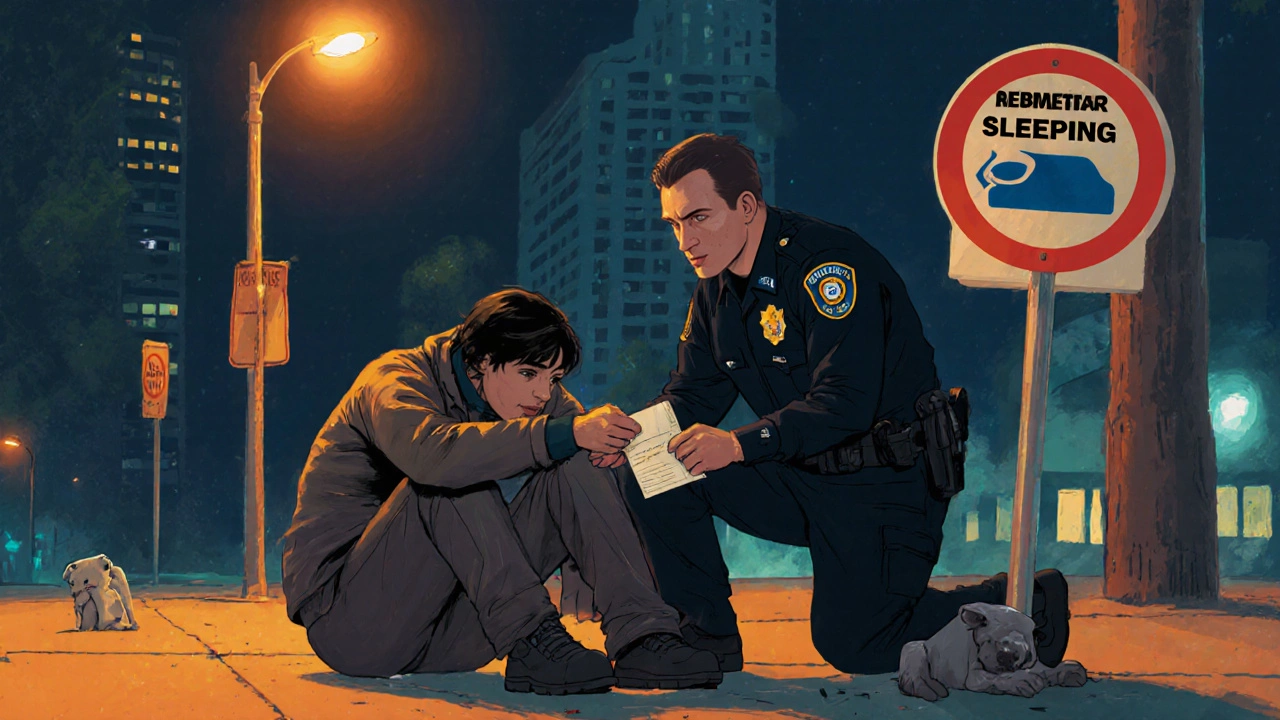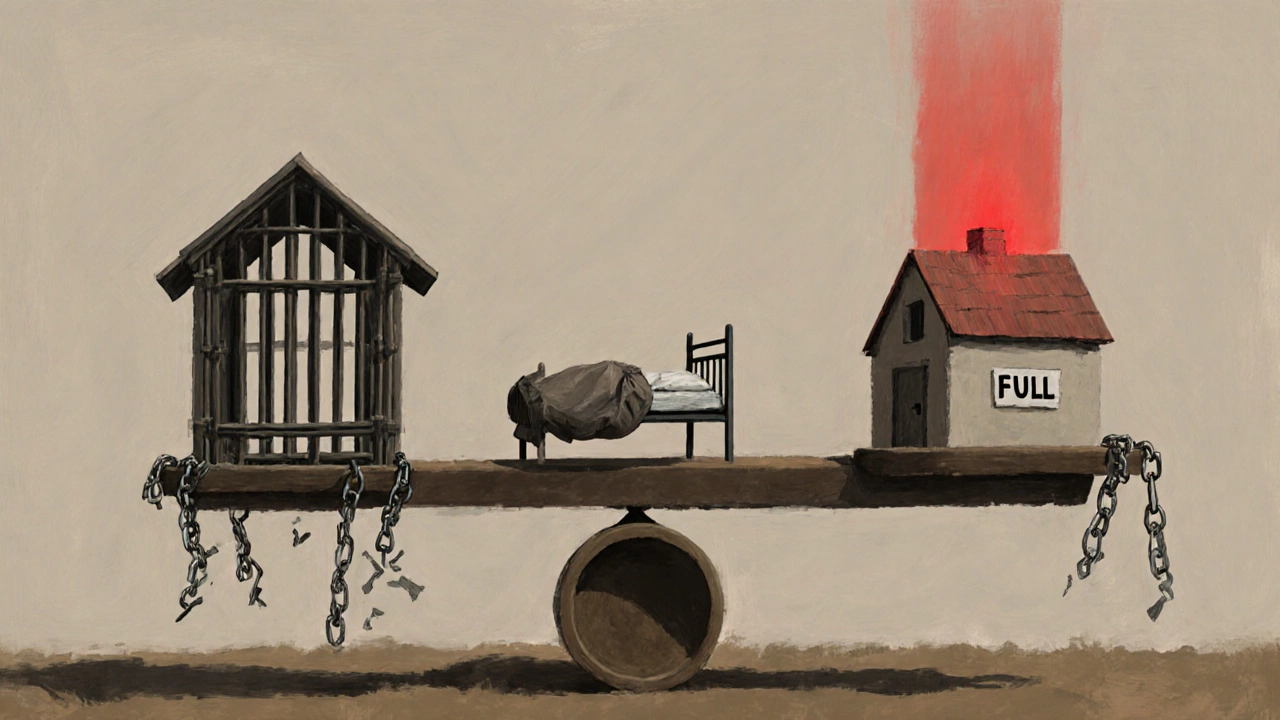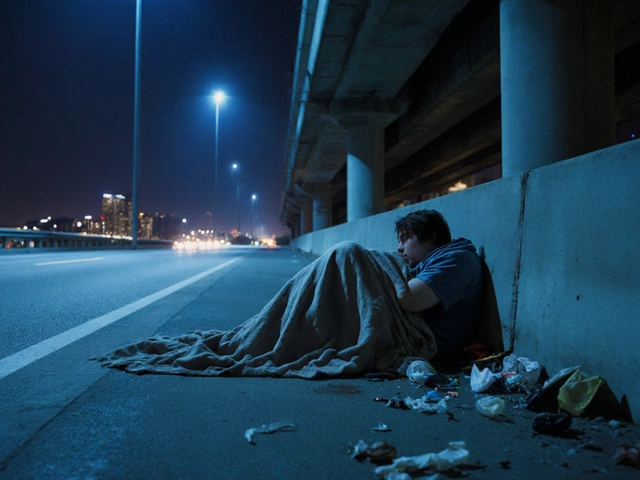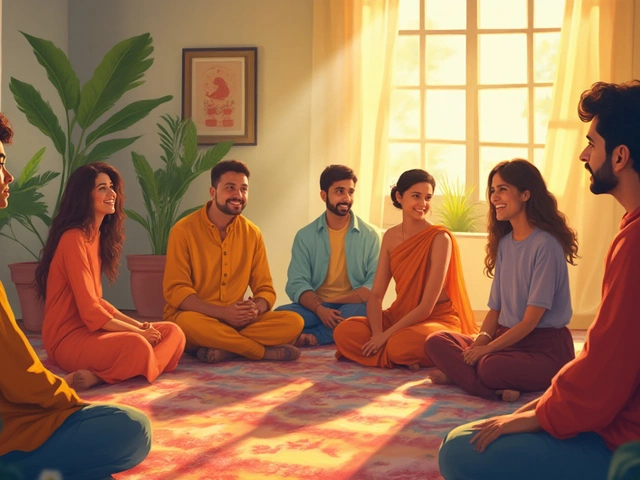Texas Homelessness Law Calculator
Based on the article: Texas has approximately 1,800 shelter beds for 27,000 homeless people. This means shelter coverage is less than 7%. Many cities criminalize sleeping outside when shelters are full.
When shelters are not available, sleeping outside may not be a crime. But when shelters are full, local ordinances make it illegal.
Your Rights Assessment
Every night in Texas, hundreds of people sleep on sidewalks, under bridges, or in doorways-not because they want to, but because they have no other choice. And in many cities across the state, doing exactly that is against the law.
It’s Not Illegal to Be Homeless. But Sleeping Outside Is.
There’s no law in Texas that says being without a home is a crime. That’s not how the legal system works. But what happens when you try to rest? That’s where things get complicated.
Over 40 cities in Texas have passed ordinances that ban sleeping, sitting, or lying down in public spaces-especially in downtown areas, parks, or near businesses. These are called anti-camping ordinances. In Austin, for example, it’s illegal to camp in public parks after 10 p.m. In Houston, you can’t sleep on sidewalks if there’s even a single available bed in a shelter. In San Antonio, sitting on the curb with a blanket can get you fined $500.
These rules don’t target people who are homeless by name. They’re written to apply to everyone. But in practice, they only affect one group: people without homes. A person with a house can nap on a bench without consequence. A person without one? They’re breaking the law.
What Happens When You Get Caught?
Getting cited for violating an anti-camping law doesn’t just mean a fine. It often leads to arrest, jail time, or a criminal record-something that makes it even harder to get a job, housing, or government assistance later.
In 2023, Dallas police issued over 1,200 citations for sleeping in public. About 30% of those people were arrested because they couldn’t pay the fine. In El Paso, a man was jailed for 45 days after being caught sleeping under a highway overpass. He had no prior record. He just had nowhere else to go.
These aren’t rare cases. They’re standard procedure in cities that treat homelessness as a public nuisance instead of a housing crisis.
Shelters Aren’t Always an Option
When police cite someone for sleeping outside, they often say, “There are shelters available.” But that’s not the whole story.
Texas has roughly 1,800 shelter beds for an estimated 27,000 homeless people on any given night. That’s less than 7% coverage. Many shelters are full by 6 p.m. Some require you to leave during the day. Others won’t take couples, pets, or people with mental health conditions. A 2024 report from the Texas Homeless Network found that 62% of people who tried to enter a shelter were turned away-sometimes because they had a criminal record, sometimes because they were transgender, sometimes because they had a dog.
And even when a bed is available, many people don’t feel safe there. Sexual assault, theft, and violence are reported in shelters across the state. One woman in Fort Worth told a city council meeting, “I’d rather sleep under a bridge than risk being raped in a shelter.”

Why Do Cities Keep Passing These Laws?
City officials say they’re trying to keep public spaces clean and safe. They point to litter, trash, and complaints from business owners. But research shows these laws don’t reduce homelessness-they just move it.
A 2022 study from the University of Texas found that after Austin cracked down on camping near downtown, the number of people sleeping in public didn’t drop. It just shifted to neighborhoods farther from the city center. The same thing happened in Houston after they cleared encampments near the river. People didn’t disappear. They just got harder to see.
Meanwhile, the cost of enforcing these laws is high. In 2023, Austin spent $3.2 million on police sweeps and court fees for homeless citations. That’s more than the entire annual budget for its housing assistance program.
What’s Actually Working?
Some Texas cities are starting to realize that punishing homelessness doesn’t fix it. They’re trying something different.
In Austin, the city launched a pilot program called “Safe Sleeping Sites.” Instead of arresting people, they provide designated areas with portable toilets, trash bins, and security. No fines. No arrests. Just a place to rest. Early results show a 40% drop in public complaints and a 25% increase in people connecting with social services.
In Denton, the city partnered with a nonprofit to offer free bus passes to homeless residents so they could reach shelters outside the city limits. In Lubbock, they started a “Housing First” initiative-giving people permanent housing before requiring them to get counseling or job training. After one year, 89% of participants stayed housed.
These aren’t perfect solutions. But they’re cheaper, more humane, and more effective than jail.

The Legal Fight Is Growing
People are fighting back-in court.
In 2024, a federal judge in San Antonio ruled that criminalizing sleeping outside when no shelter is available violates the Eighth Amendment’s protection against cruel and unusual punishment. The decision was based on a 2023 U.S. Supreme Court ruling in City of Grants Pass v. Johnson, which actually weakened protections for homeless people. But the San Antonio judge said the city still had to provide real alternatives before enforcing bans.
That ruling is being appealed. But it’s the first time in Texas that a court has forced a city to prove it’s offering real help-not just punishment.
What Can You Do?
If you’re homeless and living in Texas, know your rights:
- You cannot be arrested for sleeping outside if there are no available shelter beds.
- You have the right to ask for a copy of the ordinance you’re being cited under.
- You can request a public defender if you’re arrested.
If you’re not homeless but want to help:
- Support local groups like the Texas Homeless Network or the Coalition for the Homeless.
- Advocate for housing-first policies at city council meetings.
- Donate to shelters that allow pets, couples, and people with mental illness.
- Don’t call police on someone sleeping outside. Call a local outreach team instead.
Homelessness isn’t a crime. It’s a failure of policy. And in Texas, that failure is written into the law-one fine, one arrest, one night spent under a bridge at a time.
Is it illegal to sleep in your car in Texas?
There’s no statewide law banning sleeping in your car. But many cities have local ordinances that make it illegal to park overnight in certain areas-like residential neighborhoods, parks, or business districts. In Austin, you can’t sleep in your car in public right-of-way areas. In Houston, you can be cited for overnight parking if you’re not in a designated lot. Enforcement varies, but police often use these rules to push people out of their vehicles when no shelters are available.
Can you be arrested for panhandling in Texas?
It depends on how you do it. Simply asking for money is legal. But if you stand near an ATM, block traffic, or approach people aggressively, you can be charged with disorderly conduct or trespassing. Cities like Dallas and Fort Worth have banned “aggressive panhandling” near banks or ATMs. In 2023, over 500 people were cited for panhandling in Dallas alone-most of them were homeless.
Are there any Texas cities that don’t criminalize homelessness?
Yes, but they’re rare. San Marcos and College Station have no anti-camping laws. Amarillo stopped enforcing its ordinance in 2023 after a lawsuit. But most major cities-Austin, Houston, Dallas, San Antonio, El Paso-still have active bans. Even in cities without formal laws, police often use other charges like loitering, trespassing, or public nuisance to remove people from public spaces.
How many homeless people are there in Texas?
According to the 2024 Point-in-Time Count by the U.S. Department of Housing and Urban Development, Texas had an estimated 27,000 people experiencing homelessness on any given night. That’s the third-highest number in the U.S. Nearly 40% are unsheltered-sleeping outside, in cars, or in abandoned buildings. The number has grown 12% since 2020, largely due to rising rents and lack of affordable housing.
Can homeless people get free housing in Texas?
There’s no automatic housing program. But some options exist. The Texas Department of Housing and Community Affairs offers emergency rental assistance for people at risk of homelessness. Some counties have housing vouchers for veterans, families, or people with disabilities. The main problem? There’s not enough money or housing units to meet demand. Waitlists for public housing can be years long. In Houston, the wait for a Section 8 voucher is over 18 months.
What Comes Next?
For now, the law in Texas still says you can’t rest if you’re homeless. But the tide is turning. More people are speaking up. More cities are testing real solutions. And more judges are asking: if you can’t offer a bed, why are you locking someone up for trying to sleep?
Changing the law won’t end homelessness overnight. But ending the criminalization of survival is the first step.






